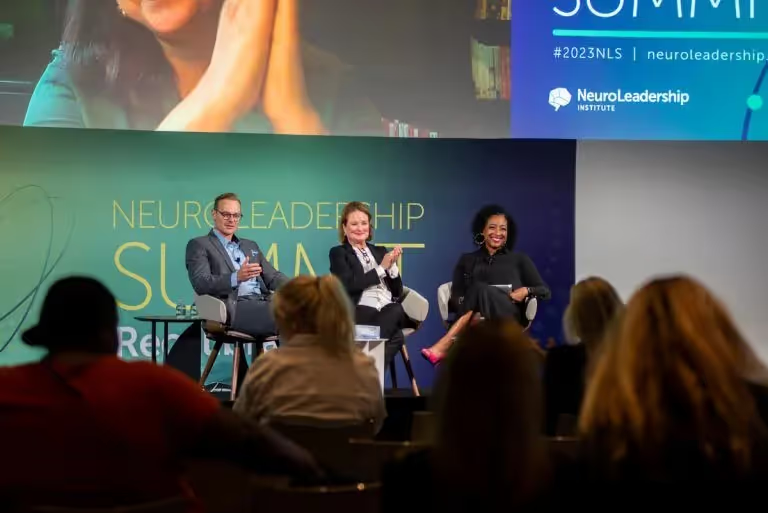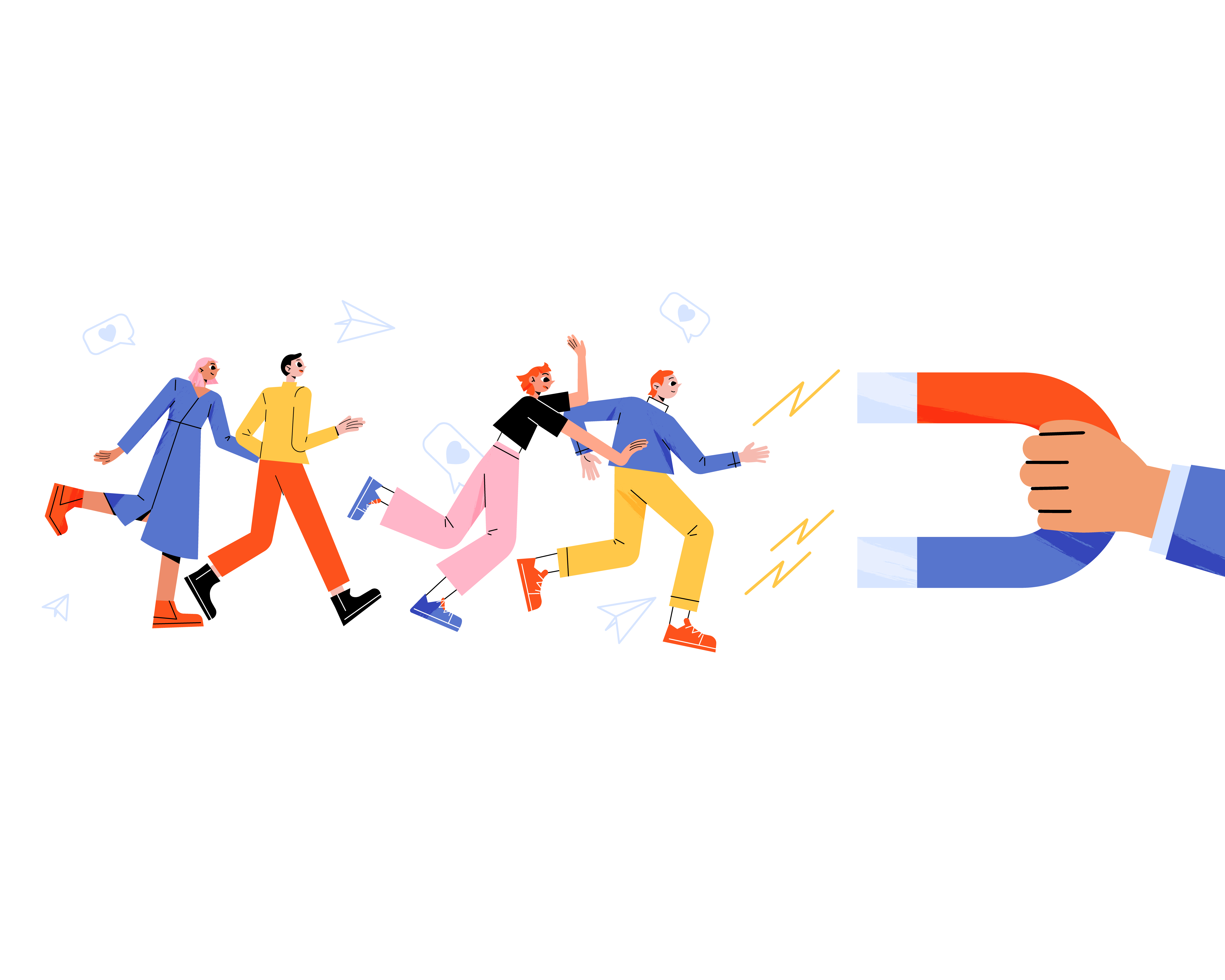The theme for the 2023 NeuroLeadership Summit is “Recalibrate,” and Day 1 attendees left with a wealth of ideas to do just that, on topics ranging from DEI to performance management to burnout.
John Edwards, Director of Leadership at NLI, opened the Summit by saying with all the changes happening in the world right now, if you don’t recalibrate, you’ll feel like a flip phone in a 5G world.
Here are some highlights from the many incredible presentations that took place today:
“Irreconcilable Differences”
The tension and disconnect between leaders and employees has never been greater. Quitting and quiet quitting are at record highs, and only about 23% of employees rate themselves as engaged. How can leaders and employees find common ground and reconcile their differences?
According to Dr. Amy Edmondson, Professor of Leadership and Management at Harvard Business School, we need to shift our mindset from one where we need to know, be right, be in control, and save face, to one of mutual learning.
Edmondson and other panelists emphasized the importance of experimentation, psychological safety, empathy, and mutual accountability to help bridge the divide.
“The Neuroscience of Burnout”
Today, 59% of workers report feeling burnout — more than during the height of the pandemic. Burnout is associated with a continuous sense of threat and high levels of the stress hormone cortisol, which impacts how we make decisions, regulate our emotions, and interact with others.
Organizations should prioritize well-being to prevent employee burnout and the ensuing disconnection, loss of focus, reduced productivity, and threat of quitting. But there are also things individuals can do to reduce burnout, such as engaging in activities from the Healthy Mind Platter.
Psychologist Dr. Lindsay Bira led participants through a breath-hold exercise to help improve their ability to reappraise stressful situations and avoid burnout.
“Prioritize the Learner in Digital Transformation”
Digitization can optimize learning, but only if done with science in mind.
According to Tapio Kymäläinen, President of Howspace, the pandemic caused a huge shift in how a learning experience can work as people rapidly developed skills in using digital tools. Panelists tied the effectiveness of digital learning to social learning, the AGES Model™, personal relevance, and problem solving.
“The Evolution of DEI”
With the recent Supreme Court ruling on affirmative action, many organizations are asking themselves how they can stay the course on their commitments to diversity, equity, and inclusion (DEI). But Kenji Yoshino, professor at NYU School of Law, argued that the conflation of affirmative action and DEI isn’t accurate because DEI touches on so much more, such as unconscious bias training, sponsorship and mentorship, heritage months, and affinity groups.
“DEI will and must change,” he said. “So long as we remain steadfast and are resolved, it will not be moved. It will be transformed.”
Keep reading for Day 2 highlights.
At its essence, Recalibrate — the theme of the 2023 NeuroLeadership Summit — means, “What do I need to do next to get me where I want to go?” As John Edwards, Director of Leadership at NLI, noted in his Opening Remarks for Day 2, what got you here likely won’t get you there.
Day 2 built on discussions from Day 1 around the Recalibrate theme, with conversations about the future of artificial intelligence (AI) in the workplace, nurturing high performers, valuing neurodiversity, examining what the future holds for learning, and many other topics.
Here are some highlights from Day 2:
“Making Al Work at Work”
Bob Johansen, Distinguished Fellow at the Institute for the Future, said the question isn’t whether AI will augment how humans think and work, but how. Fellow panelists agreed that the presence of AI will require a greater focus on humans.
“All basic human needs will stay no matter how fast technology changes,” said Dr. Scott Barry Kaufman, cognitive scientist at Columbia University.
As a result, leaders will need to double down on their efforts to support employees. According to Dr. Teodor Grantcharov, Professor of Surgery at Stanford University, the most difficult thing to change is not data or technology, but culture.
“Cultivating an Organization of High Performers”
Can everyone be a high performer?
Becks Port, Chief People Officer at 10X Genomics, said yes, but only if done right. Port identified five key ingredients for creating a dream team: encourage a growth mindset, hire slowly, fire/move quickly, give feedback continuously, and encourage deep collaboration.
These ingredients, Port said, create teams where high performers can keep striving for more, while being surrounded by other high performers who inspire them.
“Inclusion Through the Lens of Neurodiversity”
As leaders begin to embrace all forms of employee diversity, they are reconsidering cognitive disorders like ADHD and autism, and certain movement disorders, as potential sources of strength.
Often, panelists said, neurodiverse employees excel in specific domains. When leaders can identify those strengths, rather than see neurodiversity as a weakness, they can optimally include everyone and raise the team’s performance.
Dr. Batia Wiesenfeld, Professor of Management at NYU Stern School of Business, recommends that leaders empower people to use their voice and define for themselves how they think.
“Recalibrate: The Future of Learning”
AI-enabled learning is poised to be faster and more distributed than ever. In the future, panelists say, learning won’t be a heavy burden that takes place in one physical or digital location.
Instead, it will become a seamless experience of “learners being able to ask a question fully in the flow of work,” said NLI Advisor Deb Bubb. For example, imagine asking AI how to handle a tough feedback conversation. At the same time, the AGES Model™ will continue to tell us how humans learn best, despite changing circumstances.
As the future rushes toward us, it’s up to leaders to notice these changes and ensure their employees can work with AI to learn, perform, and grow.





.avif)


